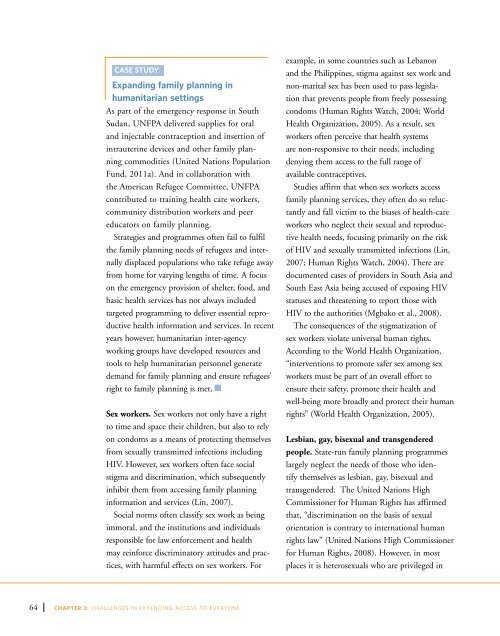State of World Population 2012 - Country Page List - UNFPA
State of World Population 2012 - Country Page List - UNFPA
State of World Population 2012 - Country Page List - UNFPA
You also want an ePaper? Increase the reach of your titles
YUMPU automatically turns print PDFs into web optimized ePapers that Google loves.
CASE STUDY<br />
Expanding family planning in<br />
humanitarian settings<br />
As part <strong>of</strong> the emergency response in South<br />
Sudan, <strong>UNFPA</strong> delivered supplies for oral<br />
and injectable contraception and insertion <strong>of</strong><br />
intrauterine devices and other family planning<br />
commodities (United Nations <strong>Population</strong><br />
Fund, 2011a). And in collaboration with<br />
the American Refugee Committee, <strong>UNFPA</strong><br />
contributed to training health care workers,<br />
community distribution workers and peer<br />
educators on family planning.<br />
Strategies and programmes <strong>of</strong>ten fail to fulfil<br />
the family planning needs <strong>of</strong> refugees and internally<br />
displaced populations who take refuge away<br />
from home for varying lengths <strong>of</strong> time. A focus<br />
on the emergency provision <strong>of</strong> shelter, food, and<br />
basic health services has not always included<br />
targeted programming to deliver essential reproductive<br />
health information and services. In recent<br />
years however, humanitarian inter-agency<br />
working groups have developed resources and<br />
tools to help humanitarian personnel generate<br />
demand for family planning and ensure refugees’<br />
right to family planning is met.<br />
Sex workers. Sex workers not only have a right<br />
to time and space their children, but also to rely<br />
on condoms as a means <strong>of</strong> protecting themselves<br />
from sexually transmitted infections including<br />
HIV. However, sex workers <strong>of</strong>ten face social<br />
stigma and discrimination, which subsequently<br />
inhibit them from accessing family planning<br />
information and services (Lin, 2007).<br />
Social norms <strong>of</strong>ten classify sex work as being<br />
immoral, and the institutions and individuals<br />
responsible for law enforcement and health<br />
may reinforce discriminatory attitudes and practices,<br />
with harmful effects on sex workers. For<br />
example, in some countries such as Lebanon<br />
and the Philippines, stigma against sex work and<br />
non-marital sex has been used to pass legislation<br />
that prevents people from freely possessing<br />
condoms (Human Rights Watch, 2004; <strong>World</strong><br />
Health Organization, 2005). As a result, sex<br />
workers <strong>of</strong>ten perceive that health systems<br />
are non-responsive to their needs, including<br />
denying them access to the full range <strong>of</strong><br />
available contraceptives.<br />
Studies affirm that when sex workers access<br />
family planning services, they <strong>of</strong>ten do so reluctantly<br />
and fall victim to the biases <strong>of</strong> health-care<br />
workers who neglect their sexual and reproductive<br />
health needs, focusing primarily on the risk<br />
<strong>of</strong> HIV and sexually transmitted infections (Lin,<br />
2007; Human Rights Watch, 2004). There are<br />
documented cases <strong>of</strong> providers in South Asia and<br />
South East Asia being accused <strong>of</strong> exposing HIV<br />
statuses and threatening to report those with<br />
HIV to the authorities (Mgbako et al., 2008).<br />
The consequences <strong>of</strong> the stigmatization <strong>of</strong><br />
sex workers violate universal human rights.<br />
According to the <strong>World</strong> Health Organization,<br />
“interventions to promote safer sex among sex<br />
workers must be part <strong>of</strong> an overall effort to<br />
ensure their safety, promote their health and<br />
well-being more broadly and protect their human<br />
rights” (<strong>World</strong> Health Organization, 2005).<br />
Lesbian, gay, bisexual and transgendered<br />
people. <strong>State</strong>-run family planning programmes<br />
largely neglect the needs <strong>of</strong> those who identify<br />
themselves as lesbian, gay, bisexual and<br />
transgendered. The United Nations High<br />
Commissioner for Human Rights has affirmed<br />
that, “discrimination on the basis <strong>of</strong> sexual<br />
orientation is contrary to international human<br />
rights law” (United Nations High Commissioner<br />
for Human Rights, 2008). However, in most<br />
places it is heterosexuals who are privileged in<br />
64 CHAPTER 3: CHALLENGES IN EXTENDING ACCESS TO EVERYONE
















